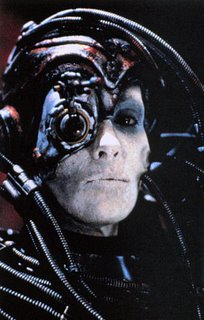 The Borg: Was Jesus the Son of God? For Some Christians, Easter Holds the Answer
The Borg: Was Jesus the Son of God? For Some Christians, Easter Holds the AnswerSaturday, December 30, 2006
"In shorthand that I often use, the gospels are about both the pre-Easter Jesus (Jesus as a figure of history before his death) and the post-Easter Jesus (what Jesus became after his death).
" . . . I see the pre-Easter Jesus as a Jewish mystic who knew God, and who, as a result, became a healer, wisdom teacher and prophet of the kingdom of God. The latter led to his being killed by the authorities who ruled his world. But I do not think he proclaimed or taught an extraordinary status for himself. The message of the pre-Easter Jesus was about God and the kingdom of God, and not about himself.
"Rather, I see the grand statements about Jesus -- that he is the son of God, the Light of the World and so forth -- as the testimony of the early Christian movement. These are neither objectively true statements about Jesus nor, for example in this season, about his conception and birth. To speak of him as the son of God does not mean that he was conceived by God and had no biological human father. Rather, this is the post-Easter conviction of his followers." link
(HT to Fr. Bob) photo
Quote: Marcus J. Borg, Hundere chair in religion and culture in the philosophy department at Oregon State University
St. Andrew's: let's remind ourselves why we're in this battle: The Theology of Heresy in Central New York
Google results: Marcus Borg Episcopal Church
Borg, Dozier and Schori: What Does a "Dream of God" Look like
12/7/2006
Ralph Webb
In her investiture sermon, Presiding Bishop Katharine Jefferts Schori spoke of what she called the "dream of God" and equated it with her "vision of shalom." She described it as the "homecoming" of all human beings to a place of peace with God and, even more, the restoration of the entire created order to that "shalom." The United Nations' Millennium Development Goals are the vehicle through which The Episcopal Church (TEC) can play its part in fulfilling this "dream." In the end, there will be "a world where no one goes hungry … no one is sick or in prison … no one enjoys abundance at the expense of the other … all enjoy Sabbath rest in the conscious presence of God."
The "dream of God" imagery may have constituted a tribute on Bishop Jefferts Schori's part to the late Dr. Verna J. Dozier, an Episcopal layperson, teacher, and author. Dozier's most popular book, The Dream of God: A Call to Return, has greatly influenced many progressives. Episcopal clergy such as the Rev. Ed Bacon, Bishop Michael Curry, and the Rev. Susan Russell, as well as progressive Christian authors such as Marcus Borg, have referenced this "dream of God" metaphor.1 The book often is used for discussion groups in progressive parishes. the rest at IRD


0 Comments:
Post a Comment
<< Home